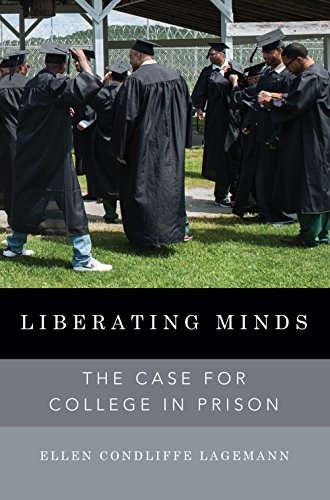by Melanie Holmes
Ellen Condliffe Lagemann wants us to care about men and women who have sold drugs on street corners, committed burglary, and even worse: murder. In Liberating Minds: The Case for College in Prison, she calls upon America to care enough to college educate them.
The U.S. prison system is by far the largest in the world. Among this startling number of inmates, of those released, more than half will return to crime and jail (called recidivism). This rate drops to 2% for those who graduate from a College-in-Prison program (CIP). Critics call education for people who are incarcerated “coddling.” Lagemann would disagree; with considerable experience teaching and advising in six medium and maximum-security New York prisons, she makes the case for how CIP can change lives, build communities, and strengthen the fabric of America.
Enlightened Citizenship
President Harry S. Truman’s Commission on Higher Education asserted that, “only an informed, thoughtful, tolerant people can develop and maintain a free society.” In this book, Lagemann lays out a powerful argument for why the incarcerated deserve to be part of this enlightened citizenship. She shows readers how a college education gives a second chance to those who exit prison doors, reduces recidivism, which in turn decreases prison populations. She also convincingly discusses how this decrease can create wider societal benefits, including freeing up prison funds to make higher education affordable for all Americans.
Balance Sheet
Liberating Minds goes into the exorbitant costs of crime, and how it impacts K-12 and higher education. Lagemann challenges us to take a hard look at America’s misaligned “prisons-over-schools” priorities. She provides compelling argument for why we need to rethink the investment of limited financial resources—our tax dollars—and how CIP programs result in important returns on investment.
On the Outside
In her book, Lagemann lists many reasons why people formerly incarcerated are unable to successfully re-enter society. Conversely, she discusses how CIP alums released from prison find themselves ready to embrace new possibilities for their lives. We learn how CIP alums develop skills and perspectives that enhance the chance of living as law-abiding citizens, and how they can help others learn from their mistakes and avoid crime. Lagemann shows how being CIP alums bring many benefits to society-at-large.
Call to Action
History has proven that “warehousing” prisoners doesn’t build a better America. And there are 4.4 million ex-felons on the streets today with no hope for tomorrow. Lagemann says we can’t afford not to care about this issue, and calls for bold action.
President Obama said that raising college graduation rates and making college affordable for all is “the economic issue of our time.” Lagemann’s arguments and case studies help us understand the big picture of mass incarceration. She brings us face-to-face with assumptions about America’s prison system as well as reasons for crippled state budgets. She asks tough questions that endeavor to bring about a paradigm shift for the education of America—all of America.
Melanie Holmes is the author of The Female Assumption: A Mother’s Story, Freeing Women from the View that Motherhood is a Mandate which won a 2014 Global Media Award from the Population Institute.

